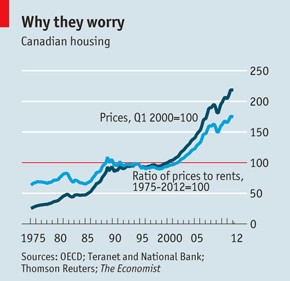(单词翻译:单击)
Finance and Economics; Canada's housing market; Time for a bigger needle; The latest attempt to prick a bubble;
财经;加拿大的住宅市场;该出手时就出手;戳破泡沫的最新举措;
Canada's reputation for financial regulation is starry. Its banks got through the crisis unscathed. According to Moody's, a ratings agency, Royal Bank of Canada sits alongside HSBC and JPMorgan Chase in the top tier of global banks. And Canadian policymakers are old hands at pulling “macroprudential” levers of the sort now in vogue among rich-world central banks.
加拿大的金融监管一向广受赞誉。它的银行业在这场危机中做到了独善其身。根据评级机构穆迪的报告,加拿大皇家银行与汇丰银行以及摩根大通同列,跻身全球银行界的第一梯队。同时,加拿大的政策制定者也是运用宏观审慎政策的老手,这一政策如今也常被其他富国的央行使用。

But questions still nag. Some say that Canada's banks are flattered by a huge indemnity offered by Canada Mortgage and Housing Corp (CMHC), a public institution that insures mortgages with a loan-to-value ratio of more than 80%. CHMC's book grew to 567 billion Canadian Dollar(557 billion Dollar) in 2011, up from 345 billion Canadian Dollar four years earlier. And Canada's housing market looks very frothy on some measures: The Economist's analysis of price-to-rent ratios suggests that Canadian properties were about 75% above their long-run “fair value” in the first quarter of 2012 (see chart). Although less than 0.5% of CHMC's mortgages are in arrears, such exuberance is a worry. The central bank recently labelled housing as “the most important domestic risk to financial stability in Canada”.
但是,仍有问题缠身。部分人士认为,加拿大的银行被加拿大抵押和住房公司(CMHC)提供的巨额补偿金美化了,CMHC是一家为贷款估值比率超过80%的抵押贷款提供保险的公共机构。在2011年,CHMC的抵押贷款额从四年前的3450亿增长到了5670亿加元(合5570亿美元)。并且,从一些指标来看,加拿大的房地产充斥着泡沫:《经济学人》以房价租金比所做的分析显示,在2012年第一季度,加拿大的物业价格高出它们的长期公允价值75%。纵然仅有低于0.5%的CHMC抵押贷款存在拖欠的情况,但这样的繁荣仍让人忧虑。最近,央行也冠以楼市 “危及加拿大金融稳定性的最大国内隐患”。

Repeated efforts by policymakers to take the heat out of housing have not had a noticeable effect. So on June 21st Jim Flaherty, the finance minister, had another go, his fourth in four years. Some of the new measures were cosmetic. Buyers of homes worth more than 1m Dollar have been able to get mortgage-default insurance from CMHC with a downpayment of only 5%. In practice, it is hard to find buyers in this bracket who do not have lots of equity in their homes. But after July 9th mortgages for homes of this value will not be eligible for CMHC coverage.
政策制定者们给楼市降温的不断尝试并无明显成效。于是,在6月21日,加拿大财长吉姆·费拉逖,在四年来第四次出台了一些新举措。新措施中的一些不过是表面功夫。价值过百万美元住宅的买主能得到由CMHC担保的债务违约保险以及首付仅付5%的优惠待遇。而事实上,很少有这类购房者在购房时不以大量自有资金支付价款的。不过,在6月9日之后,这类住宅将不再适用于CMHC的保险范围。
Other measures have more teeth. The maximum amortisation period for a mortgage will now be 25 years, down from 30. That should hurt demand: last year about 40% of new mortgages were for terms longer than that. Refinancing a home will be allowed only up to 80% of its value, down from 85%. Homebuyers will have to demonstrate their housing costs are no more than 39% of their gross household income. On top of Mr Flaherty's measures, the Office of the Superintendent of Financial Institutions, Canada's banking regulator, slapped a loan-to-value limit of 65% on borrowing against home equity.
其他那些则更为有力。抵押贷款最长还贷期限如今将从30年降低至25年。这势必将减少需求:去年约有40%的新贷款的期限是超过25年的。允许的房屋再融资的上限从房屋价值的85%降至只有80%。购房者还须证明他们的住房支出不超过家庭总收入的39%。费拉逖的举措中,紧随其后的是,加拿大的银行监管部门,联邦金融机构监督办公室,将贷款和自有资金间的贷款估值比率的限制猛降至65%。
Craig Alexander, the chief economist for TD Financial Group, estimates all this will be the equivalent of about a 1% rise in mortgage rates for most homebuyers. He believes that will produce a slow unwinding of the housing market. If he is right, and Mr Flaherty's various interventions avoid the collateral damage that would be caused by an actual interest-rate rise, Canada's admirers will have another thing to swoon over.
多伦多道明银行金融集团首席经济学家,克雷格·亚历山大估计,所有这些措施对于购房者而言将等同于抵押贷款利率上升1%。他认为这将促使房产市场缓慢回归。如果他的观点正确,并且费拉逖的各种干预手段能够避免可能引发实际利率上升的附带伤害,那么如此一来,加拿大的崇拜者们又将有一个可以津津乐道的话题了。


